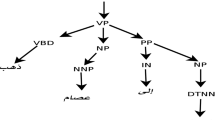Abstract
Assessing a large number of student essays is a challenging task for teachers. It requires a lot of time and effort. Therefore, the automation of this work has become essential. For a decade, Automatic Essay Scoring (AES) systems have represented a very important and complicated research axis in the field of natural language processing. In literature, various methods of automatic essay scoring (AES) have been proposed. However, most of them have concentrated on European languages, while works dealing with Arabic language are very limited.
This paper presents an overview of Arabic Automatic Essay Scoring systems. The purpose of this study is to present a state of the art of the existing methods and models of Automatic Essay Scoring (AES) systems in Arabic language. We describe some models then we compare and discuss the achieved results. Finally, we give our perspectives and challenges to propose our future work in this context.
Access this chapter
Tax calculation will be finalised at checkout
Purchases are for personal use only
Similar content being viewed by others
Notes
- 1.
Correlation is a metric for measuring the effectiveness of AES systems compared to human scoring. It is the rate of correspondence between the human score and the automatic score provided by the system [20].
- 2.
LCS is a character-based similarity algorithm that determines the similarity between two strings to the length of the longest sub-string that appears in the two sentences.
References
Gomaa, W.H., Fahmy, A.A.: Automatic scoring for answers to Arabic test questions. Comput. Speech Lang. (2013)
Al-Shalabi, E.F.: An automated system for essay scoring of online exams in arabic based on stemming techniques and Levenshtein edit operations. Int. J. Comput. Sci. Iss. (2016)
Shehab, A., Faroun, M., Rashad, M.: An automatic arabic essay grading system based on text similarity algorithms. In: Article Published in International Journal of Advanced Computer Science and Applications (IJACSA) (2018)
Al-, M.F., Azmi, A.M.: Automated evaluation of school children essays in Arabic. Int. Conf. Arab. Comput. Ling. 117, 19–22 (2017)
Al Awaida, S.A., Al-Shargabi, B., Al-Rousan, T.: Automated Arabic essay grading system based on F-score and Arabic WordNet. Jordanian J. Comput. Inf. Technol. (JJCIT) 05 (2019)
Alqahtani, A., Alsaif, A.: Automatic evaluation for Arabic essays: a rule-based system. In: 2019 IEEE International Symposium on Signal Processing and Information Technology (ISSPIT) (2019)
Abdeljaber, H.A.: Automatic Arabic short answers scoring using longest common subsequence and Arabic WordNet. IEEE Access 9(99), 1 (2021)
The Hewlett Foundation: Short Answer Scoring, Kaggle. https://www.kaggle.com/c/asap-sas/. Accessed 06 Aug 2021
Abdelali, A., Darwish, K., Durrani, N., Mubarak, H.: Farasa: a new fast and accurate Arabic word segmenter. In: Conference of the North American Chapter of the Association for Computational Linguistics: Demonstrations (2016)
Pasha, A., et al.: MADAMIRA : a fast, comprehensive tool for morphological analysis and disambiguation of Arabic. In: Proceedings of the Ninth International Conference on Language Resources and Evaluation (2014)
Regragui, Y., et al.: Arabic wordNet: new content and new applications. In: 8th Global Wordnet Conference (2016)
Pag, E.B.: Project essay grade: PEG. In: Shermis, M.D., Burstein, J. (eds.), Automated essay scoring: a cross-disciplinary perspective. pp. 43–54. Lawrence Erlbaum Associates, Mahwah, NJ (2003)
Foltz, P., Laham, D., Landauer, T.K.: The intelligent essay assessor: applications to educational technology. Inter. Multimed. Electron. J. Comput. Enhanced Learn. (1999)
Burstein, J.: The e-rater scoring engine: automated essay scoring with natural language processing. In: Shermis, M.D., Burstein, J. (eds.). Automated essay scoring: A cross-disciplinary perspective, pp. 113–122 (2003)
Runder, L., Garcia, V., Welch, C.: An Evaluation of IntelliMetric™ Essay Scoring System. J. Technol. Learn. Assessment (2006)
Hussein, M.A., Hassan, H., Nassef, M.: Automated language essay scoring systems: a literature review. PeerJ Comput. Sci. (2019)
Alikaniotis, D., Yannakoudakis, H., Rei, M.: Automatic text scoring using neural networks. Computat. Lang. (cs.CL). (2016)
Taghipour, K., Ng, H.T.: A neural approach to automated essay scoring. In: Proceedings of the 2016 Conference on Empirical Methods in Natural Language Processing (EMNLP). pp. 1882–1891 (2016)
Dasgupta, T., Naskar, A., Saha, R., Dey, L.: Augmenting textual qualitative features in deep convolution recurrent neural network for automatic essay scoring. In: Proceedings of the 5th Workshop on Natural Language Processing Techniques for Educational Applications (2018)
Yannakoudakis, H., Cummins, R.: Evaluating the performance of automated text scoring systems. In: Proceedings of the Tenth Workshop on Innovative Use of NLP for Building Educational Applications (2015)
Alsaif, A.: Modelling Discourse Relations for Arabic, pp. 736–747 (2011)
Chang, T.-H., Sung, Y.-T.: Automated chinese essay scoring based on multilevel linguistic features. In: Xiaofei, Lu., Chen, B. (eds.) Computational and Corpus Approaches to Chinese Language Learning, pp. 253–269. Springer Singapore, Singapore (2019). https://doi.org/10.1007/978-981-13-3570-9_13
Walia, T.S., Josan, G.S., Singh, A.: An efficient automated answer scoring system for Punjabi language. Egyptian Inf. J. 20(2), 89–96 (2019)
Lilja, M.: Automatic essay scoring of Swedish essays using neural networks. M.S. thesis, Dept. Statist., Uppsala Univ., Stockholm, Sweden (2019)
Citawan, R.S., Mawardi, V.C., Mulyawan, B.: Automatic essay scoring in E-learning system using LSA method with N-gram feature for Bahasa Indonesia. In: MATEC WEB Conf., vol. 164 (2018)
Cheon, M.-A., Kim, C.-H., Kim, J.-H., Noh, E.-H., Sung, K.-H., Song, M.-Y.: Automated scoring system for korean short-answer questions using predictability and unanimity. KIPS Trans. Softw. Data Eng. 5(11), 527–534 (2016)
Author information
Authors and Affiliations
Corresponding author
Editor information
Editors and Affiliations
Rights and permissions
Copyright information
© 2022 The Author(s), under exclusive license to Springer Nature Switzerland AG
About this paper
Cite this paper
Machhout, R.A., Zribi, C.B.O., Bouzid, S.M. (2022). Arabic Automatic Essay Scoring Systems: An Overview Study. In: Abraham, A., Gandhi, N., Hanne, T., Hong, TP., Nogueira Rios, T., Ding, W. (eds) Intelligent Systems Design and Applications. ISDA 2021. Lecture Notes in Networks and Systems, vol 418. Springer, Cham. https://doi.org/10.1007/978-3-030-96308-8_108
Download citation
DOI: https://doi.org/10.1007/978-3-030-96308-8_108
Published:
Publisher Name: Springer, Cham
Print ISBN: 978-3-030-96307-1
Online ISBN: 978-3-030-96308-8
eBook Packages: Intelligent Technologies and RoboticsIntelligent Technologies and Robotics (R0)




